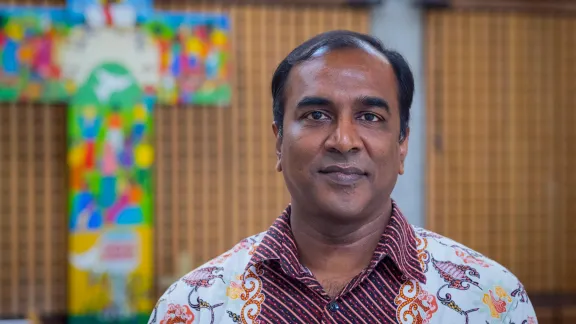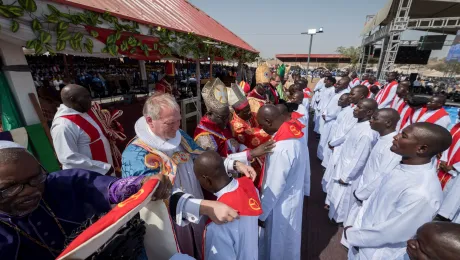Malaysian Bishop Steven Lawrence shares his experience of church leadership in a multifaith, multicultural and global context, and how the COVID-19 pandemic has affected the church.

Bishop Steven Lawrence, Evangelical Lutheran Church in Malaysia. Photo: LWF/A. Danielsson
Voices from the Communion: Bishop Steven Lawrence, Evangelical Lutheran Church in Malaysia
(LWI) – Malaysian Bishop Steven Lawrence took office at the height of the COVID-19 pandemic. In this interview, he reflects on ministry in a multifaith and multicultural context, and belonging to The Lutheran World Federation (LWF). He was also one of the participants at the annual LWF Retreat of Newly Elected Leaders (RoNEL), from which he shares some impressions.
Please tell us about yourself?
I grew up in a Christian family, among a Muslim-majority community in Penang on the northwestern coast of Malaysia. We cherish our relationships with one another. We respect each other’s beliefs and traditions, and part of this closeness includes sharing meals in each other's homes.
I was attached to the church from Sunday school. I went on to become a youth leader in the late 1990s, and I was an active member of the Boys’ Brigade. It was a very good time but also challenging as a teenager, because one is going through a lot of changes, and the responsibility to lead others can weigh you down. During my high school years at the Saint Xavier’s Institution, I always felt this soft but persistent nudge to lead. My church leader at the time supported me a lot, and I gradually realized the call for me to serve the Lord in full-time capacity in the church.
How was the preparation into full-time ministry?
At the age of 22, I joined the Malaysia Theological Seminary, an interdenominational Protestant institution in Seremban city. I graduated with a bachelor's degree in theology in 2005. During my studies I was attached to two outreach ministries, and spent about one year as part of my in-house training under [the late] Bishop Julius D. Paul. As a candidate, I was sent to Good Hope Lutheran Congregation, Petaling Jaya, my first parish, and later ordained on 31 October 2006.
What were the first years like as a pastor?
Christians make up around nine percent of Malaysia’s population, which comprises Muslims in the majority (over 60 percent), as well as Buddhists, Hindus and other traditional Chinese religions. My first posting in 2003 to Seremban in Negeri Sembilan was as an intern student. It was very interesting, because I was responsible for two outreach ministries, congregations that were in the initial stages of becoming a church. We focused mostly on the children’s ministry, including Sunday School and tuition classes. We started with about 10 people attending worship on Sundays to 40-50 by the time I left in 2005. Rasah Lutheran Outreach grew into Seremban Lutheran Congregation, which today is one of the 26 ELCM congregations. Charis Lutheran Outreach is still an outreach area.
Through that work I realized the importance of sharing the gospel and how it can be a lifeline for others. Most of the times, together with other church workers, we were reaching out to people in disadvantaged communities, those classified by the government as B40 households, which means families living below a monthly income of Malaysian ringgit (RM) 2,500 (EUR 537). That was very important for me, working in a context where we don't just preach the Word of God, but it is made alive daily by seeing how the church helps to meet the actual needs of the people.
How did this experience influence your work in other parishes/congregations?
I think it was not just the outreach work itself, but it goes back to my initial years as a theology student, when I was struggling to define what serving the church meant. I remember a conversation with then Bishop Paul, when I asked: why are there so many issues and problems in the church? Then he just looked at me and said: “Because we the people are the church, and there will always be problems. That is why God has entrusted us as leaders to share the gospel and take care of the church.”
His response was very profound. I realized we have leaders in the church not because they are righteous and not because the church has issues and problems. Rather, God in God’s grace, has entrusted leaders as shepherds to share the gospel of Jesus Christ and in so doing, take care of God’s people. His [Bishop Paul] views about leadership inspired me; I had been looking at church leadership in a very negative way of only solving problems. But I slowly learned it was a call and commitment to serve.
I went on to be a pastor of congregations from 2006 to 2014, and worked as LWF Regional Officer for Asia from 2014 to 2017. I returned to parish work in 2018, until I was elected Bishop of the ELCM in November 2019, and consecrated in July 2020.
You assumed the bishop’s office at the height of the COVID-19 pandemic, how did this affect the church?
Church members are accustomed to going to church on Sundays. This creates a balance between everyday life and that special day in the week for prayer, worship, and fellowship with sisters and brothers in Christ. The coronavirus restrictions took away all that, and many congregation members found it very difficult because that part of their life was missing. It took a bit of time to get familiarized with the virtual connections including online visitations, but at least, we were able to offer some new space for fellowship, even though not in-person. However, as the government slowly lifted restrictions and the country opened up, new fears set in, especially for those who are most at risk. At the height of the COVID-19 pandemic, we constantly had to make decisions on who could attend church in person, who could not come, especially children and senior citizens with medical issues. It is important to make people feel safe in the church. At present, all age groups are allowed to attend in-person service.
How has the pandemic changed the church’s approach to ministry?
During the lockdowns, it was challenging to keep in touch with all the congregations. In addition, many congregants lost their jobs and it was not easy to assist everyone, but we tried our best to support each other. We also started up a new initiative called the Pastoral Care Ministry, where congregations mobilize support from the locals, and distribute food and other items to families and communities that are in need. The economic impact of the virus is still being felt across the country. However, one of the lessons learned from the crisis is the importance of sharing information, simple daily updates that make people more aware of what is going on and how they can assist in an emergency. I hope we can keep up with that.
You were among participants in this year’s Retreat of Newly Elected Leaders among LWF’s member churches. What was significant for you?
This gathering was important for me as the first international gathering since becoming ELCM bishop. I looked forward to meeting my brothers and sisters leading LWF’s churches in other parts of the world, and to have fellowship about our ministries at home and in the Lutheran communion. The Word of God reveals new lessons all the time, and for me this was the case with our reflections on 1 Kings 19 about Elijah’s struggle over his leadership capacities. In our busy schedules, many of us church leaders miss opportunities to hear God’s still voice in the silence. So RoNEL, like other LWF platforms for church leaders, is a safe space where we can be reminded about the need to seek God in the silence, to connect, pray together and support each other as members of the one body of Christ.
What does it mean for you, for your church to belong to the LWF communion?
For me, ELCM's communion with the LWF is a global partnership with a local agenda. It is about identifying individuals and developing their capacity for theological and diakonia ministries. This ensures the sustainability of ELCM and the continuity of services to members and non-members alike, locally and globally, within the LWF communion of churches, especially in Asia and with other ecumenical partners.


